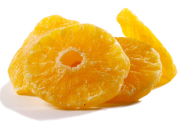Pineapple Nutrition Facts
Pineapple Nutrition Facts and Health Benefits
 Pineapples are a refreshing fruit to have, especially on a hot summer day. They have a sweet and tart taste at the same time. You can have a pineapple raw, dried, canned, in jams, fruit salads, as juice or even on some pizzas as toppings. Pineapple juice can also sometimes be used as a marinade, tenderizing and flavoring the meat at the same time. We will look at pineapple juice and it's nutrition facts further down this article.
Pineapples are a refreshing fruit to have, especially on a hot summer day. They have a sweet and tart taste at the same time. You can have a pineapple raw, dried, canned, in jams, fruit salads, as juice or even on some pizzas as toppings. Pineapple juice can also sometimes be used as a marinade, tenderizing and flavoring the meat at the same time. We will look at pineapple juice and it's nutrition facts further down this article.
So what nutrients, vitamins and minerals do we find in pineapples? They are a source of Dietary Fiber, Protein, Thiamin, Riboflavin, Niacin, Panthothenic Acid, Vitamin B6, Magnesium, Folate, Calcium, Iron, Vitamin C, Zinc, Manganese, Phosphorus, Potassium and Copper. Of these, pineapples are especially an excellent source of Vitamin C and Manganese.
Pineapple Health Benefits
Due to the make up of pineapples, they have several health benefits. In some cultures, pineapples are used for traditional medicinal purposes. Both the root and fruit may be eaten or topically applied for anti-inflammatory purposes. This means it can aid in the treatment of inflammatory conditions such as bronchitis, gout and sore throat. Pineapples have also been found to regulate the gland. It has also been found to be helpful in cases of goiter, which is where one's thyroid gland would have enlarged.
Pineapples contain a proteolytic enzyme known as bromelain. A proteolytic enzyme is one that breaks down protein. So this means that pineapples are good digestion helpers for your system. More recent studies on the bromelain found in pineapples showed that it may aid in the prevention of blood clotting. The stems of pineapples have also been found to contain some beneficial molecules. These have been found to be helpful in fighting against some cancers which include lung, ovarian, skin, breast and colon cancer. Pineapples also promote the good health of our eyes and prevent the development of age-related eye conditions such as macular degeneration and cataract.
So what does Manganese do for and in your body, seeing as we have stated that pineapples are an excellent source of this mineral? Some of the things it does are promoting the formation of healthy bones, regulating our blood sugar level, the metabolism of cholesterol and some carbohydrates and the healthy functioning of your brain. Manganese also helps your body to absorb vitamins and minerals such as Vitamin E, Magnesium and Vitamin B. One of the other important things that manganese does is to properly distribute glucose throughout the cells and parts in your body. These are just but a few of the health benefits of manganese. This and the nutrition facts to follow show you why pineapples should be in your eating healthy diet plan.
We will now take at some pineapple nutrition facts of pineapples prepared in different ways. The percent daily values (DV) are based on a 2,000 calorie diet. This therefore means that your values may differ depending on your daily calorie needs.
Fresh Whole Pineapple Nutrition Facts
Nutrition facts on a fresh pineapple show that it it an excellent source of Vitamin C. Which is one of the most important antioxidants that we can have in our bodies. It provides you with 131% of your daily value. Fresh pineapple nutrition facts also reveal that it is an excellent source of Manganese which we have mentioned it's benefits in the paragraphs above.

- Serving size- 165g
- Calories- 82
- Calories from Fat- 2
- Total Fat- 0g
- Saturated Fat- 0g
- Cholesterol- 0mg
- Sodium- 2mg, 0% of DV
- Total Carbohydrate- 22g, 7% of DV
- Dietary Fiber- 2g, 8% of DV
- Sugars- 16g
- Protein- 1g
- Vitamin A- 2% of DV
- Vitamin C- 131% of DV
- Calcium- 2% of DV
- Iron- 3% of DV
- Thiamin- 9% of DV
- Riboflavin- 3% of DV
- Niacin- 4% of DV
- Vitamin B6- 9% of DV
- Folate- 7% of DV
- Pantothenic Acid- 4% of DV
- Magnesium- 5% of DV
- Potassium- 5% of DV
- Copper- 9% of DV
- Manganese- 76% of DV
Dried Pineapple Nutrition Facts
Dried pineapples, according to their nutrition facts show that they are basically a source of Dietary Fiber, Calcium and Iron. They are also a good source of Vitamin C.

- Serving size- 1 medium piece
- Calories- 69
- Calories from Fat- 2
- Total Fat- 0.17g, 0% of DV
- Saturated Fat- 0g
- Cholesterol- 0mg
- Sodium- 1mg, 0% of DV
- Potassium- 164mg
- Total Carbohydrate- 18g, 6% of DV
- Dietary Fiber- 2g, 8% of DV
- Sugars- 13g
- Protein- 0.77g
- Vitamin A- 0% of DV
- Vitamin C- 17% of DV
- Calcium- 2% of DV <
- Iron- 2% of DV
Dole Frozen Pineapple Nutrition Facts
Frozen pineapple nutrition facts show that frozen pineapples are moderate when it comes to calories, do not contain any fat, saturated fat, cholesterol and are low in sodium. They are a source of Dietary Fiber, Iron and an excellent source of Vitamin C.

- Serving size- 140g
- Calories- 100
- Calories from Fat- 0
- Total Fat- 0g
- Saturated Fat- 0g
- Cholesterol- 0mg
- Sodium- 25mg, 1% of DV
- Total Carbohydrate- 25g, 8% of DV
- Dietary Fiber- 2g, 8% of DV
- Sugars- 21g
- Protein- 0g
- Vitamin A- 0% of DV
- Vitamin C- 80% of DV
- Calcium- 0% of DV
- Iron- 2% of DV
Canned Pineapple Nutrition Facts
Canned pineapple nutrition facts show that they are especially an excellent source of Manganese and a very good source of Vitamin C. They are also a good source of Copper, Magnesium, Thiamin and a source of Potassium, Iron, Calcium and Vitamin A.

- Serving size- 246g
- Calories- 79
- Calories from Fat- 2
- Total Fat- 0g
- Saturated Fat- 0g
- Cholesterol- 0mg
- Sodium- 2mg, 0% of DV
- Total Carbohydrate- 20g, 7% of DV
- Dietary Fiber- 2g, 8% of DV
- Sugars- 18g
- Protein- 1g
- Vitamin A- 2% of DV
- Vitamin C- 32% of DV
- Calcium- 4% of DV
- Iron- 5% of DV
- Thiamin- 15% of DV
- Vitamin B6- 9% of DV
- Magnesium- 11% of DV
- Potassium- 9% of DV
- Copper- 13% of DV
- Manganese- 138% of DV
Dole Crushed Pineapple Nutrition Facts
Nutrition facts of crushed pineapple in 100% pineapple juice. They are basically a source of Iron and Dietary Fiber. They provide you with 20% of your daily value of Vitamin C, making it a good source of the antioxidant.

- Serving size- 122g
- Calories- 70
- Calories from Fat- 0
- Total Fat- 0g
- Saturated Fat- 0g
- Trans Fat- 0g
- Cholesterol- 0mg
- Sodium- 0mg
- Potassium- 130mg
- Total Carbohydrate- 15g, 5% of DV
- Dietary Fiber- 1g, 4% of DV
- Sugars- 13g
- Protein- 0g
- Vitamin A- 0% of DV
- Vitamin C- 20% of DV
- Calcium- 0% of DV
- Iron- 2% of DV
Pineapple Nutrition Facts: Juice
Pineapple Juice nutrition facts reveal that it is also an excellent source of Magnesium and Vitamin C, providing you with 63% and 183% of your daily value respectively. Pineapple juice is used as an anthelmintic agent. An anthelmintic agent is one that has the ability to destroy and remove parasitic worms in the intestines. It is also used to fight diphtheria, throat infections and other infections of the other parts of the body. Pineapple juice also helps with nausea which includes morning and motion sicknesses.

- Serving size- 8fl oz (250ml)
- Calories- 132
- Calories from Fat- 3
- Total Fat- 0
- Saturated Fat- 0g
- Cholesterol- 0mg
- Sodium- 5mg, 0% of DV
- Total Carbohydrate- 32g, 11% of DV
- Dietary Fiber- 0g
- Sugars- 25g
- Protein- 1g, 2% of DV
- Vitamin A- 0% of DV
- Vitamin C- 183% of DV
- Calcium- 3% of DV
- Iron- 4% of DV
- Thiamin- 10% of DV
- Vitamin B6- 13% of DV
- Folate- 11% of DV
- Magnesium- 8% of DV
- Potassium- 9% of DV
- Copper- 9% of DV
- Manganese- 63% of DV


